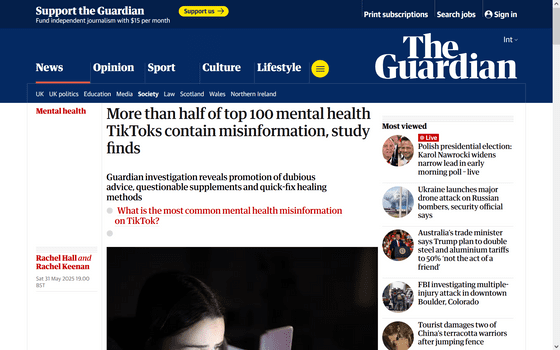52 of the top 100 mental health videos on TikTok contain misinformation

A survey by the British newspaper The Guardian revealed that more than half of the popular TikTok videos talking about mental health contain misinformation. It has long been pointed out that TikTok is full of unfounded myths, such as '
More than half of top 100 mental health TikToks contain misinformation, study finds | Mental health | The Guardian
https://www.theguardian.com/society/2025/may/31/more-than-half-of-top-100-mental-health-tiktoks-contain-misinformation-study-finds

The Guardian took the top 100 videos posted to TikTok with the hashtag '#mentalhealthtips' and shared them with psychologists and psychiatrists to get their opinion on whether the posts contained misinformation.
They found that of 100 videos about dealing with trauma, anxiety, depression, and severe mental illness, 52 contained misinformation, and many others were vague or unhelpful.
For example, they might tell personal stories about mental illness as if they were generalized stories, assert that everyday feelings are warning signs of mental illness, or tell dubious stories like 'eating an orange in the shower reduces anxiety.'

'Posts use terminology incorrectly, such as using anxiety and mental health disorders interchangeably,' said David Okai, a neuropsychiatrist and researcher in psychology at King's College London. 'Many videos offer generalised advice based on personal experience and anecdotes that may not apply to everyone. Social media often allows short, attention-grabbing stories to overshadow accurate information.'
Psychologist Amber Johnston said: 'While most of the videos contain grains of truth, they tend to overgeneralise and minimise the complexities of PTSD and trauma, and each video is 30 seconds long - the standard TikTok length. PTSD and trauma are deeply personal experiences, and the idea that 'everyone is going through the same thing' is a false statement. The information on TikTok may make your mental health worse rather than heal it.'

In Japan, NHK conducted its own investigation and confirmed that there was misinformation, such as 'drinking sodium bicarbonate citric acid water will create cancer-fighting cells.'
TikTok said it would remove videos that discourage people from seeking medical help or promote unsafe treatments, and in the UK, searches for mental health terms such as anxiety, autism and PTSD will return information from the government's National Health Service.
British Liberal Democrat MP Victoria Collins called the findings 'disturbing' and called on the government to act to keep people safe from 'harmful misinformation', reported The Guardian.
Related Posts:
in Web Service, Posted by log1p_kr







